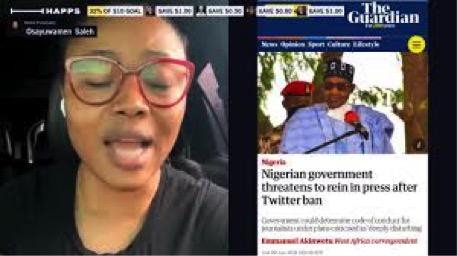NIGERIANS TAKE PRESS FREEDOM FIGHT TO SOCIAL MEDIA
Submitted by fkakooza on

Many Nigerians have taken the fight for press freedom to social media, urging authorities in the country to stop harassing journalists. Both journalists and citizens see this as the new way to highlight the plight of journalists in Nigeria.
Edetaen Ojo, in a tweet on 6th March, 2023 expressed his dismay with the use of law enforcement agencies by government to harass the media following the European Union Election Observation Mission to Nigeria’s report on media freedom. He was concerned about the declining press freedom, especially during the election process. According to the EU observation report, several journalists faced harassment by authorities. “Over the last eight months, at least 17 journalists who made critical comments on politically-sensitive topics offline or online, were detained or questioned by police for inciting disturbance, for defamation or for similar, vaguely defined offences,” the report reads.
David Hundeyin, a journalist also took it to his twitter account to recall his ordeal in 2020 when he was threatened and had to flee the country for a few weeks. “I don’t think you understand how terrifying it was for me in January 2020, to get a call from a security analyst the night after I published that story telling me, ‘I hope you’re not sleeping in your house this night.’ What was my crime for God’s sake? I wrote a story,” he wrote.
These stories reflect the reality of media freedom in Nigeria as journalists are harassed, arrested, tortured, threatened and sometimes even killed every time they try to do their work as they are forced to keep a blind eye on government faults.
George Adjete, a Nigerian citizen confirms that journalists are sometimes victims of the unfair laws. In the 2022 World Press Index by Reporters Without Borders, Nigeria ranked 129 out of 180 countries exhibiting a decline from 120 and 115 in 2021 and 2020 respectively. According to RSF, Nigeria is “one of West Africa’s most dangerous and difficult countries for journalists, who are often watched, attacked, arbitrarily arrested and even killed.”
Despite the Nigerian constitution providing for freedom of expression and media freedom, there are a number of existing laws and policies that restrict freedom of expression inclusive of media freedom in Nigeria and among these is the Cybercrime Act 2015, which criminalizes the use of internet to send “any message that is grossly offensive, indecent, obscene or menacing.” If convicted, a journalist could face up to three years’ imprisonment or a fine of 7 million Naira or both. This Cybercrime law has been used to arrest and detain journalists and bloggers that have been critical of the government.
The National Broadcasting Commission (NBC) that regulates broadcast media in Nigeria has been constantly criticized for continuously constraining media houses by fining TV and Radio stations for controversial content. NBC also issued a directive to broadcast stations to suspend the use of Twitter as a source of gathering and disseminating information following the government directive to ban twitter in Nigeria in 2021.
- 478 reads
